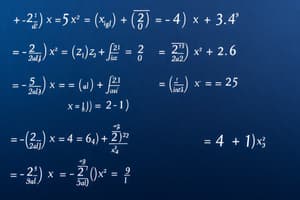Podcast
Questions and Answers
The roots of the equation $x^2 + 4x + 6 = 0$ are
The roots of the equation $x^2 + 4x + 6 = 0$ are
- Rational and equal
- Irrational (correct)
- Imaginary
- Rational and not equal
The value of 'k' that makes $4x^2 + kx + 25 = 0$ have equal roots is
The value of 'k' that makes $4x^2 + kx + 25 = 0$ have equal roots is
- ±13
- ±8
- ±20
- ±10 (correct)
The quadratic equation whose sum and product of the roots are -1 and 1 respectively is
The quadratic equation whose sum and product of the roots are -1 and 1 respectively is
- $3x^2 + x + 1 = 0$
- $x^2 + x + 1 = 0$
- $2x^2 + x + 1 = 0$
- $4x^2 + x + 1 = 0$ (correct)
If $2 + 3i$ is a root of the equation $x^2 + ax + b = 0$, then $a, b$ are
If $2 + 3i$ is a root of the equation $x^2 + ax + b = 0$, then $a, b$ are
If $
alpha$, $
beta$ are roots of $x^2 + kx + 2 = 0$ and $
alpha eta = 1$, the value of $k$ is
If $ alpha$, $ beta$ are roots of $x^2 + kx + 2 = 0$ and $ alpha eta = 1$, the value of $k$ is
Flashcards are hidden until you start studying
Study Notes
Quadratic Equations
- The roots of the quadratic equation x² + 4x + 6 = 0 are irrational.
- For the quadratic equation 4x² + kx + 25 = 0 to have equal roots, the value of 'k' is ±10.
- The quadratic equation whose sum and product of the roots is -1 and 1, respectively, is 4x² + x + 1 = 0.
Complex Roots
- If 2 + 3i is a root of the equation x² + ax + b = 0, then the values of (a, b) are (4, -13).
Properties of Quadratic Equations
- If α and β are roots of the quadratic equation x² + kx + 2 = 0 and αβ = 1, then the value of k is 3.
- If a and β are roots of the quadratic equation px² + qx + r = 0, then the sum of the roots is -q/p.
- For the quadratic equation ax² + bx + c = 0 to have roots in the ratio m : n, the condition is mnb² = ac(m + n)².
- If one root is equal to the square of the other root of the equation x² + x - k = 0, then the value of k is 2.
- If a and β are roots of the quadratic equation ax² - ax + b = 0, then α + β is 2.
- If a and β are roots of the quadratic equation x² - p(x + 1) + c = 0, then (1 + a)(1 + β) is c.
Studying That Suits You
Use AI to generate personalized quizzes and flashcards to suit your learning preferences.




